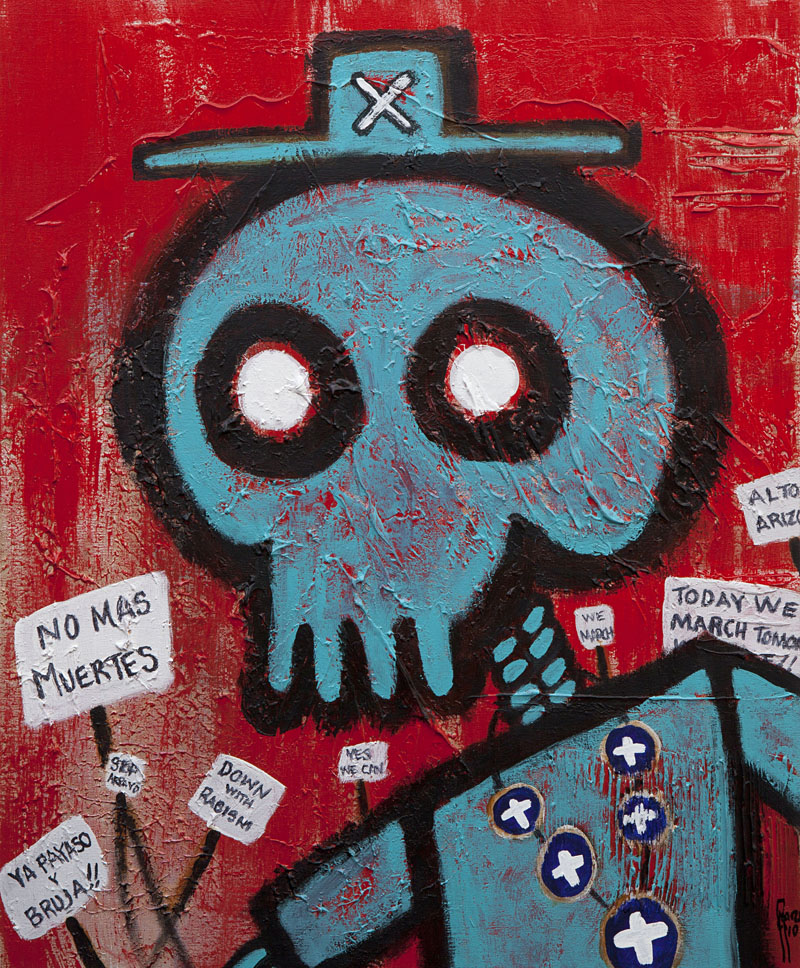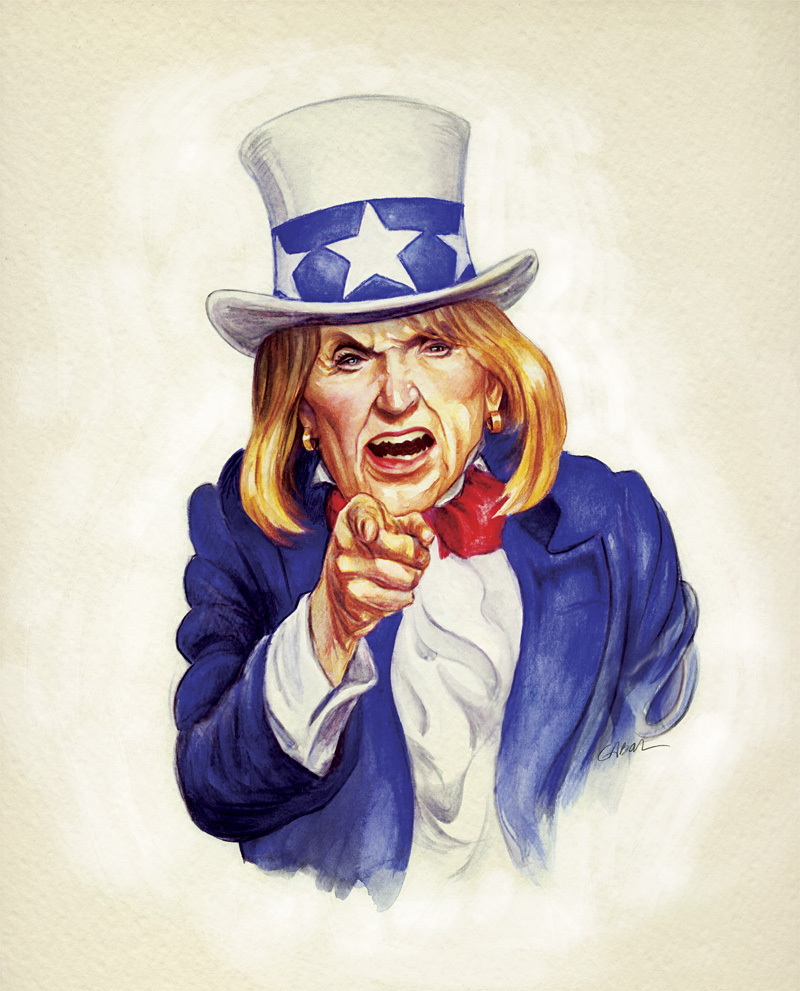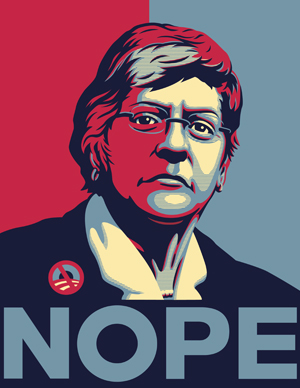Supreme Court Justice Antonin Scalia wasn’t merely skeptical; he appeared contemptuous of the Justice Department’s argument trying to stop Arizona’s cops from deporting undocumented Mexicans.
“But if, in fact, somebody who does not belong in this country is in Arizona, Arizona has no power?” asked the incredulous Scalia. ” . . . Are you objecting to harassing the—the people who have no business being here? Surely you’re not concerned about harassing them?”
God forbid.
Nor did Scalia suffer cara de culo alone.
Chief Justice John G. Roberts concluded an observation by noting, “It seems to me that the federal government just doesn’t want to know who’s here illegally or not.”
With these comments the United States Supreme Court signaled that its expected ruling this month will, in significant part, validate Arizona’s Senate Bill 1070.
If that happens, being brown will permit cops across America to ask: Which brown are you?
A journalist I work with, Monica Alonzo, grew up on the hardscrabble west side of Phoenix with brown skin.
Although she was an American, something as simple as stopping to fill her gas tank could prompt a cruel refrain: “Go back to Mexico.”
She remembers the white school-board members who voted themselves out of paying taxes to support the mostly Latino school in the town of El Mirage. Her cousin was routinely pulled over if he ventured into a neighboring white community.
But these are memories, not complaints. This treatment did not stop Monica Alonzo. She made herself into an award-winning investigative reporter.
Today, she buys gas where she chooses.
She put the petty meanness behind her and made something of herself.
But SB 1070 changed everything.
In Arizona, brown people, citizen and immigrant, must now prove their papers are in order. We sic badges and dogs on people of color. Sheriff Joe Arpaio’s men wear ski masks and arm themselves with automatic weapons to stop Mexicans with cracked windshields. Families are separated, with parents deported and children left to fend for themselves. Those who remain are terrorized.
After one Arpaio sweep through the town of Guadalupe, children were too frightened to attend their Catholic confirmation lest relatives be arrested.
Like the pre–Civil War era of free and slave states, America is about to divide along color lines.
Six states already have a version of Arizona’s bill and are awaiting the ruling for implementation. In all, 16 states filed amicus briefs urging the Supreme Court to support SB 1070.
Where once we depended upon the federal government to protect minorities from fire hoses and segregated schoolhouses named Booker T. Washington or George Washington Carver, this month the Supreme Court is poised to tell us how far local cops can go to detain brown people.
As if the federal government hadn’t gone far enough.
In fact, President Obama has deported 1.5 million Latinos, more than any president. Such a massive displacement of humanity does not come without brutality.
In the first six months of 2011, 46,000 mothers and fathers were shipped back to Mexico and left their children in America. And more than 20,000 other parents were ordered out but have yet to depart. Roughly 22 percent of all deportees were forced to abandon children—children who are American citizens.
What SB 1070 does is criminalize the undocumented. The law forces all police officers to ascertain a person’s immigration status whenever a cop interacts with a brown person. Lights on a license plate too dim? A call about domestic violence? If an officer harbors any suspicion, he or she must ask for proof of citizenship. And if a cop doesn’t do that, any citizen can sue the cop for not taking deportation seriously. To protect against lawsuits, the cautious cop must question all Latinos.
The stated purpose of SB 1070 is “attrition through enforcement,” a chillingly efficient phrase.
How does the cop on the beat tell a Mexican from a Mexican-American?
And so, the 74 percent of all Latinos in America who are, in reality, U.S. citizens must be harassed about their origins. Unlike everyone else, they must carry papers.
Why?
Obama sells the roundup of brown people through a program called Secure Communities. The alternative is clear enough.
Have we forgotten that the Irish, Italians, Jews, and Cubans generated almost as many mug shots as American dreams?
Polls show that SB 1070 and similar laws in other states are supported by voters at rates between 60 to 70 percent nationally.
In states that have passed laws allowing local law enforcement to hunt the undocumented, the financial impact has been devastating.
Last August, Monica Alonzo examined labor shortages in the farm economy, where an estimated 80 percent of the workforce is undocumented.
She learned that efforts to recruit Americans to pick crops have failed abysmally.
In the late 1990s, Alonzo reported, “California launched a ‘welfare to farmwork’ program in the Central Valley at a time when regional unemployment was as high as 20 percent . . . A massive campaign addressed training, transportation, and other obstacles to getting workers in the fields. Though there were more than 100,000 potential workers, only three jobs were filled.”
Things weren’t any easier in Washington state. There, “a labor shortage for the 2006 cherry harvest prompted an advertising blitz to recruit about 1,700 needed workers, particularly for the much larger apple harvest that was just around the corner. Only 40 people took jobs.”
According to Alonzo’s research, things were even worse in the East. “The following year, in North Carolina,” she wrote, “farm officials set up a statewide hotline to fill crop and livestock jobs. Two calls were received.”
Things have only gotten worse with anti-immigrant legislation.
In 2007 more than 90,000 migrants fled Oklahoma, causing a loss of $1.9 billion to the state’s economy. Since passage of SB 1070, Arizona has shed 200,000 migrants, who fled to friendlier states.
Agriculture is the largest sector in Georgia’s economy, yet lawmakers passed stiff anti-immigrant legislation projected to cost the state $391 million in lost crops. The governor suggested that farmers hire ex-cons to work the fields. The ex-cons refused. More than 70 percent of Georgia’s restaurants had labor shortages and lost, on average, $21,000 per eating establishment.
Last year Alabama one-upped Arizona and passed a tougher, meaner anti-immigrant measure.
Research at the University of Alabama said the state could lose up to $10.8 billion and 140,000 jobs.
The governor demanded that the statehouse reconsider. Alabama legislators responded by making the law tougher.
Why, in the middle of a recession, would statehouses vote to cripple their economies by driving Mexicans to flee?
Why, with President Obama deporting more Latinos than at any time in the nation’s history, would legislators demand local cops inspect citizenship papers?
The inescapable answer: Race!
The guiding proponent of these statutes is Kris W. Kobach, who helped author SB 1070.
At the time, Kobach was senior counsel to the legal arm of the Federation for American Immigration Reform (FAIR).
In 1986, John Tanton, FAIR’s founder, wrote: “As whites see their power and control over their lives declining, will they simply go quietly into the night? Or will there be an explosion?”
Not surprisingly, the Southern Poverty Law Center called FAIR a racially driven organization.
Alabama’s copycat legislation was penned by State Senator Scott Beason, who has called blacks “aborigines” and declared that when it came to immigration, folks ought to “empty the clip.”
In Arizona the bill drafted by Kobach was sponsored by then–State Senator Russell Pearce.
In 2006 Pearce forwarded to his followers a screed he’d read entitled Who Rules America. The essay took exception to race mixing and a “world in which every voice proclaims the equality of races, the inerrant nature of the Jewish ‘Holocaust’ tale, the wickedness of attempting to halt the flood of non-White aliens pouring across our borders . . . “
The essay, which originated from a neo-Nazi newsletter, went on to ask: “And who are these all-powerful masters of the media?”
The answer was obvious: “As we shall see, to a very large extent they are Jews.”
Eerily, the message Pearce forwarded to political supporters in 2006 foreshadowed coming bloodshed.
“On the other hand, a White racist—that is, any racially conscious White person who looks askance at miscegenation or at the rapidly darkening racial situation in America—is portrayed, at best, as a despicable bigot who is reviled by the other characters, or, at worst, as a dangerous psychopath who is fascinated by firearms and is a menace to all law-abiding citizens . . . ” read Pearce’s send-along.
Last month Pearce acolyte J.T. Ready slaughtered his girlfriend, her daughter and boyfriend, and a six-month-old infant before turning the gun on himself.
Ready was a neo-Nazi who was photographed at white-supremacist rallies in full National Socialist regalia. Following the passage of SB 1070, Ready formed an armed militia that hunted Mexicans in southern Arizona.
After the multiple homicides, Pearce tried to distance himself from Ready. This sleight-of-hand was complicated for Pearce: he’d endorsed Ready’s failed run for the Mesa City Council, and, in fact, had ordained Ready into the priesthood of the Mormon faith and attended his baptism.
These, then, are the miscreants who have stirred this nation’s darkest prejudices.
None of this was grist in the Supreme Court. The Obama administration opted to argue only the narrowest of issues: State immigration laws trampled federal domain. With an election looming, the president chose not to confront nativist anxiety.
Latino groups and civil-rights organizations have filed lawsuits that challenge what Obama ducked. These suits recount what happens on American streets when brown people are detained, when Mexicans and Central Americans are crowded into detention centers, when families are ripped apart.
When law enforcement cordons off brown communities, the law, as applied, is apartheid.
Perhaps you can understand, after a wave of hateful legislation and a galling discussion by justices and attorneys in the country’s highest court, that there are those not content with jurisprudence.
You see, all this legal eloquence comes after generations of families picked crops on their way to citizenship, only to encounter lawyers and lawmakers worse than any field boss.
Monica Alonzo’s father crossed the border from Mexico. His family worked in the cotton fields. They earned less, picked more, and kept their mouths shut. Kids in school were slapped if they were overheard speaking Spanish.
“They mistreated the Mexicans the worst in El Mirage,” says Alonzo. “Mexicans went straight to jail or were roughed up for minor offenses.”
“They were made to feel like worthless people,” recalls Alonzo. “Many Mexicans instilled in their children the importance of speaking only English. Not in my house. For my father, the treatment created a lot of resentment towards whites. We weren’t allowed to speak English at home for some time. We would get in trouble if he knew we were mixing with the Anglos.”
There was a common warning in her home: “Beware of the blue-eyes.”
Alonzo says her family and their friends feared deportation, even after they were living here legally.
“They didn’t want to draw attention to themselves.”
That’s done and gone.
In Arizona thousands have taken to the street in protest against SB 1070. Abuelas are joined by kids without papers. Together they commit civil disobedience and force arrests.
The Supreme Court doesn’t grasp that its decision is not the final word on the subject.
Media everywhere erupted with the recent news that whites now account for a minority of births in America for the first time. Latinos have the highest fertility rate and are already the largest minority.
“If [reform] doesn’t happen as part of a revolution,” says Alonzo, “the sheer numbers will eventually force change.”
See that little roly-poly hija rock ‘n’ rolly, wearing pull-ups, sporting earrings, and sitting on her mama’s lap?
She is your future.
Michael Lacey is the executive editor of Village Voice Media.







